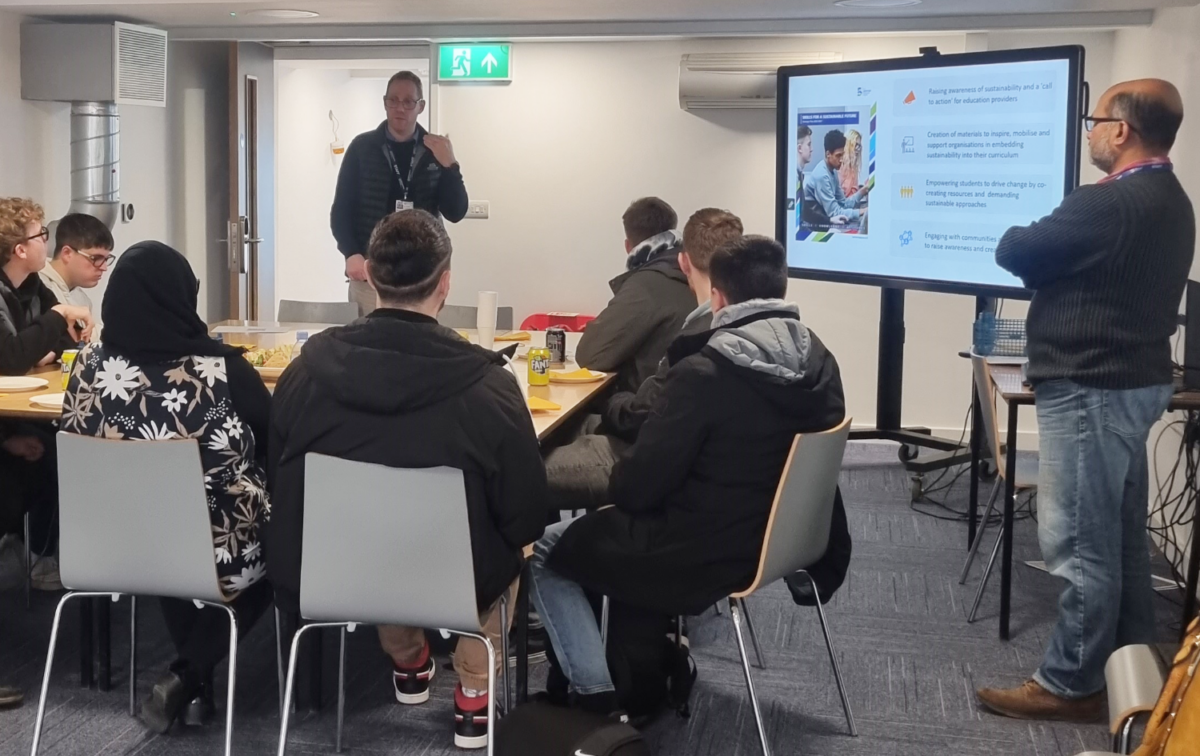Levelling Up and the Department for Education

When Sally Ann Hart, MP for Hastings, asked the Department for Education and Skills about discussions with Department for Levelling Up, Housing and Communities, about skills and technical education in coastal towns, the Skills Minister Alex Burghart’s response was that plans were largely the same as for everywhere else. He replied:
“We are investing £3.8 billion more in FE and skills over the Parliament as a whole, to ensure people can access high-quality training and education that leads to good jobs, addresses skills gaps, boosts productivity and supports levelling up.
We have also launched T Levels, which are world-class programmes developed with over 250 leading employers to the same quality standards as apprenticeships and will ensure more young people gain the skills and knowledge demanded by employers…
The government is rolling out Local Skills Improvement Plans, which will set out the key changes needed to make technical education and training more responsive to local labour market skills needs.”
Retaining the Broad Policy Approach
So even before the ‘Levelling Up’ white paper was published, it was clear that the DfE wished to stick to its broad policy approach. Left behind places with weaker economies and labour markets, lower skills levels, fewer jobs and lower wages were to be offered the same policy options as richer, more productive, higher income places. In short, one size must – more or less – fit all.
Inadequate Resources for the Broad Policy Approach
Of course, there is a lack of funding for the existing broad policy approach to education and skills, let alone for left behind places.
According to the IFS, even with additional funding from the recent spending review, college spending per pupil aged 16-18 in 2024 will still be around 10% below 2010 levels, while school sixth form spending per pupil will be a whopping 23% below 2010 levels.
Additional funding for adult education and apprenticeships announced in Spending Review 2021 – because of the scale of the cuts over the last decade – means that spending in 2024 will still be one-third lower than 2010.
Post-16 Education and Skills Policies in England
So, what does the ‘Levelling Up’ white paper set out to do in education? Mission 5 sets out an ambitious target of getting 90% of children to expected standards in English and Maths and increasing the percentage in the worst performing areas by over a third. And Mission 6, sets out an ambition to increase skills with 200,000 people getting ‘high quality training’ annually, with 80,000 from the least well qualified areas.
Outside of the two missions for education and skills, there are two noteworthy policy developments. The first is the introduction of Education Investment Areas in 55 local places in England, with increased pay for schoolteachers, new ‘highly selective sixth forms’, and underperforming schools to join established MATs. A second is the creation of 9 new Institutes of Technology.
Left Behind Places
Lack of Ambition
Nothing demonstrates the lack of ambition of the white paper in terms of post-16 education and skills policy than Mission 6. According to Stephen Evans of the Learning and Work Institute, over 800,000 adult learners have been lost over the last decade and so it will take several years just to restore numbers. And 80,000 places won’t go very far in ‘left behind’ towns or regions.
Take Blackpool – picked out in the Levelling Up white paper and where Boris Johnson and Michael Gove visited – skills are low and will take time to turnaround. According to ONS data, 24% (19,400) of adults have qualifications at L4+ compared with 43% nationally. To reach this average, Blackpool will need 15,439 people to get a higher education qualification.
Nearby in Oldham, these numbers are higher still. 28.3% (40,700) have L4+ and to get to the national average a further 21,285 would need to be added to this figure. Furthermore, to get Oldham to the national average at other qualification levels would require 14,824 more people at L3 (up from 73,400 to 88,224), and 4,438 fewer adults without any qualifications if the town was to be in line with the national average (i.e from 9.5% to 6.4%).
Lack of Funding
So, between such places, neither the 200,000 nor 80,000 targets will go very far. This shows the broader challenge facing skills policy in England – scale and sufficiency. It is hard to see how residents will access high paying jobs nearby if skill levels are low. And it is also hard to see how better quality jobs might develop locally.
As research from the OECD in areas like Blackpool and Greater Manchester shows, the focus should not just be about increasing skills and qualifications but also on how these skills are utilised in local firms and sectors or in public services and other local institutions. In this way the connections to other missions will be vital – including to R&D, innovation, good jobs and productivity. In other words this isn’t just a supply side problem.
These are big issues and they show the need for more ambition and resource from DfE and Treasury, as well as the need for more differentiation in support for places with weakest skills and local economies.
Lack of Devolution
Largely ‘one size fits all’ approaches to qualifications, funding, accountability and the operation of national programmes won’t work. But apart from AEB in large cities, the system is completely centralised. Even AEB is fixed at/by the centre on what it can be spent on.
LSIPs too weak to Break the Cycle
DfE will point to LSIPs as a mechanism that meets local demand, but this will be insufficient to drive local economic change. Why? Firstly, they can’t channel extra funding in order to close these big gaps. And second, they will reflect the nature of the economy in left behind places. So, if it’s a ‘low skill equilibrium’ and employers are functioning at lower levels of productivity and pay then LSIPs may simply reinforce rather than break the cycle.
Similar issues affect apprenticeships and T Levels in places like Oldham and Blackpool. With fewer high skilled businesses, there are fewer placements or jobs with training. Again, it is hard to see how LSIPs can offer necessarily different strategies in places with these different challenges. This situation is different in other places. Margate isn’t the same as Milton Keynes and Rochdale isn’t Reading. Interventions need to be different if serious inequalities are to be reduced.
A Series of Big Problems
So, all of this and the succession of the skills and Levelling Up white papers leave us with a series of big problems. The first is insufficient ambition and a lack of resources. It may be that the latter is driving the former. Second is a lack of differentiation in either understanding or policy delivery – some places need more as well as different kinds of help. Third, there is the problem of delivering skills policy in splendid isolation from other areas – such as R&D, health, local government, or the private sector and the demand side of the economy. The six capitals analysis in the Levelling Up white paper shows how these must come together to create thriving places.
The Role of Colleges and Universities
But neither the white paper nor DfE policy, says enough about how colleges and universities can drive them – glossing over their importance to social and institutional capital as well as to physical, intangible and financial capital. Likewise with the twelve missions and the importance of institutions to infrastructure, productivity, local growth as well as to health, wellbeing and civic pride.
Instead, colleges and universities sit in separate sealed off parts of human capital, overseen by centralised policy frameworks that don’t care to understand the different and interlocking needs of struggling places. This means that there are deep conceptual problems alongside the particular shortcomings of the policies or targets already described. That’s not a good way to oversee FE and skills policy and not to ‘level up’ either.
Recommendation 1
Education Investment Areas (EIAs) should also include post-16 skills and further education, with similar support for staff pay and a sizeable fund for allocation to places with low skills levels.
Recommendation 2
Within places covered by Education Investment Areas, LSIPs should form part of a broader, longer-term approach, linking colleges and universities to wider strategies on the economic and social needs of a place.
Recommendation 3
In line with the Levelling Up white paper’s sixth ‘capital’, colleges in struggling places should be protected and supported as key local institutions. They will need to play a part in turning such places around and DfE cannot be indifferent.
Andy Westwood, Professor of Government Practice, University of Manchester
Post-16 Education and Skills: Levelling Up Everyone, Everywhere
Campaign for Learning’s paper Post-16 Education and Skills: Levelling Up Everyone, Everywhere, is a collection of 18 articles and recommendations by leading stakeholders and thinkers across the post-16 education and skills sector.
The paper covers six key considerations for the Levelling Up agenda – national and place based strategies, young people, lifelong training, lifelong learning and post-16 providers.
As the articles show, from the perspective of post-16 education and skills policy, levelling up is about people as well as places – the policy canvas is vast, the perspectives diverse and the insights important.
Together, our authors demonstrate the need for strong, nationally based as well as place based strategies if everyone, everywhere aged 16 and over are to level up through education and skills’
Part 1: Levelling Up and National and Place
- Andy Westwood, Professor of Government Practice, University of Manchester - Levelling Up and the Department for Education
- Sam Freedman, Research Fellow, Institute for Government – Levelling Up and Post-16 Education and Skills
- Fiona Aldridge, Head of Skills Insight, West Midlands Combined Authority – Levelling Up the West Midlands by 2030
- Mark Hilton, Policy Director, London First – Levelling Up London by 2030
Part 2: Levelling Up and Young People
- Geoff Barton, General Secretary, ASCL - Levelling Up and Education: Lots of Stuff but Little Substance
- Sam Tuckett, Senior Researcher, Education Policy Institute – Levelling Up 16-19 Education
- Becci Newton, Director of Public Policy and Research, IES – Levelling Up Participation by 16-18 Year Olds
- Kathleen Henehan, Senior Policy and Research Analyst, Resolution Foundation – Levelling Up 18-24 Year Olds in England
Part 3: Levelling Up and Lifelong Training
- Olly Newton, Executive Director, The Edge Foundation - Placing Vocational Education at the Heart of Levelling Up
- Mandy Crawford-Lee, Chief Executive, UVAC – Higher Technical Education, Higher & Degree Apprenticeships and Levelling Up
- Ewart Keep, Emeritus Professor, University of Oxford – The Role of Employer Training in Levelling Up
Part 4: Levelling Up and Lifelong Learning
- Stephen Evans, Chief Executive, L&W- Levelling Up in England through Lifelong Learning
- Susan Pember, Policy Director, HOLEX – Levelling Up as a Nation of Lifelong Learning
- Simon Parkinson, Chief Executive, WEA – The Future of Adult Learning is in the Hands of Local Leaders
Part 5: Levelling Up and Post-16 Providers
- David Hughes, Chief Executive, Association of Colleges – Well-Funded Colleges to Serve Every Community
- Nick Hillman, Director, HEPI – A ‘Higher Education Institute’ in Every Community
- Chris Hale, Director of Policy, Universities UK – Levelling Up and Widening Participation into Higher Education
- Jane Hickie, Chief Executive, AELP – Levelling Up is as much about People as Places











Responses